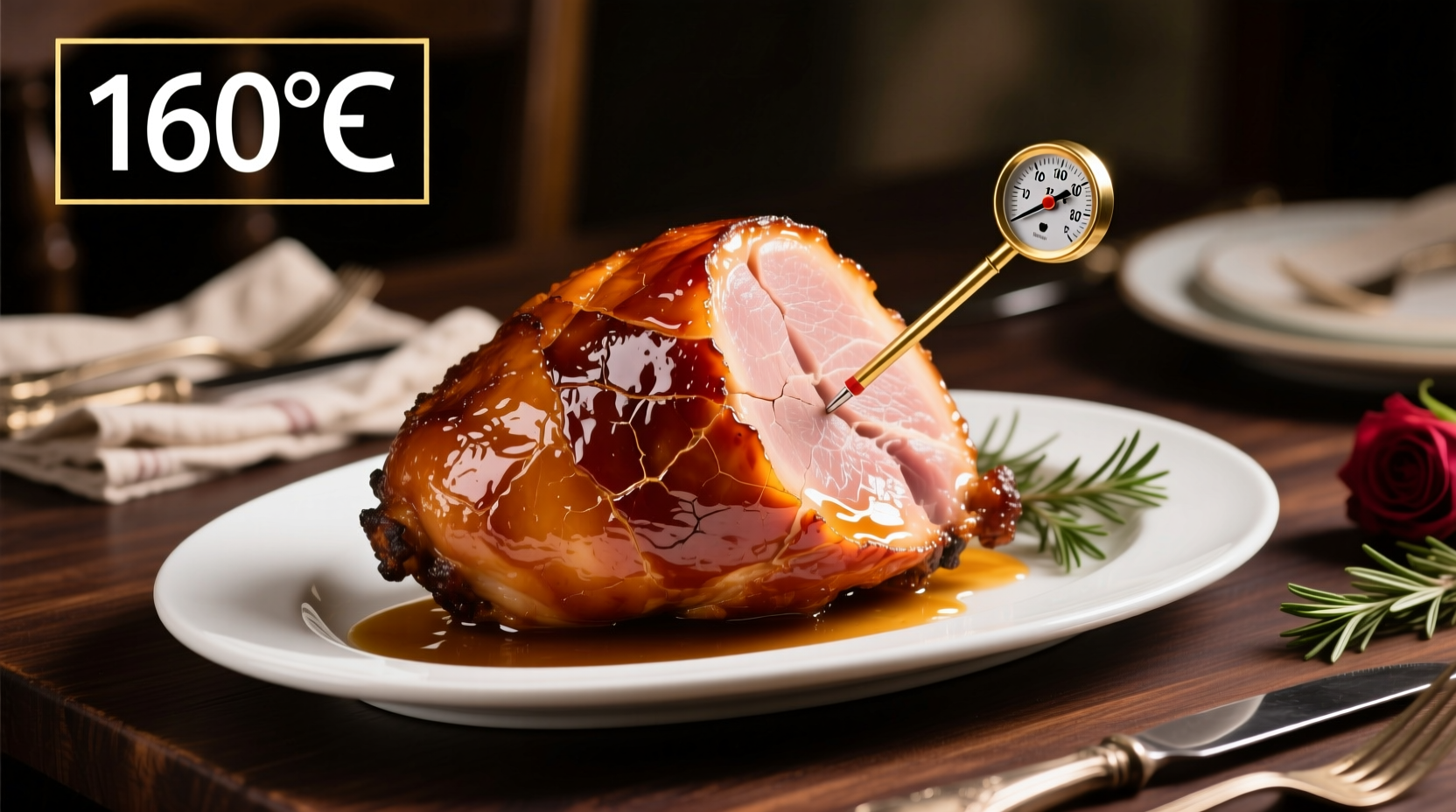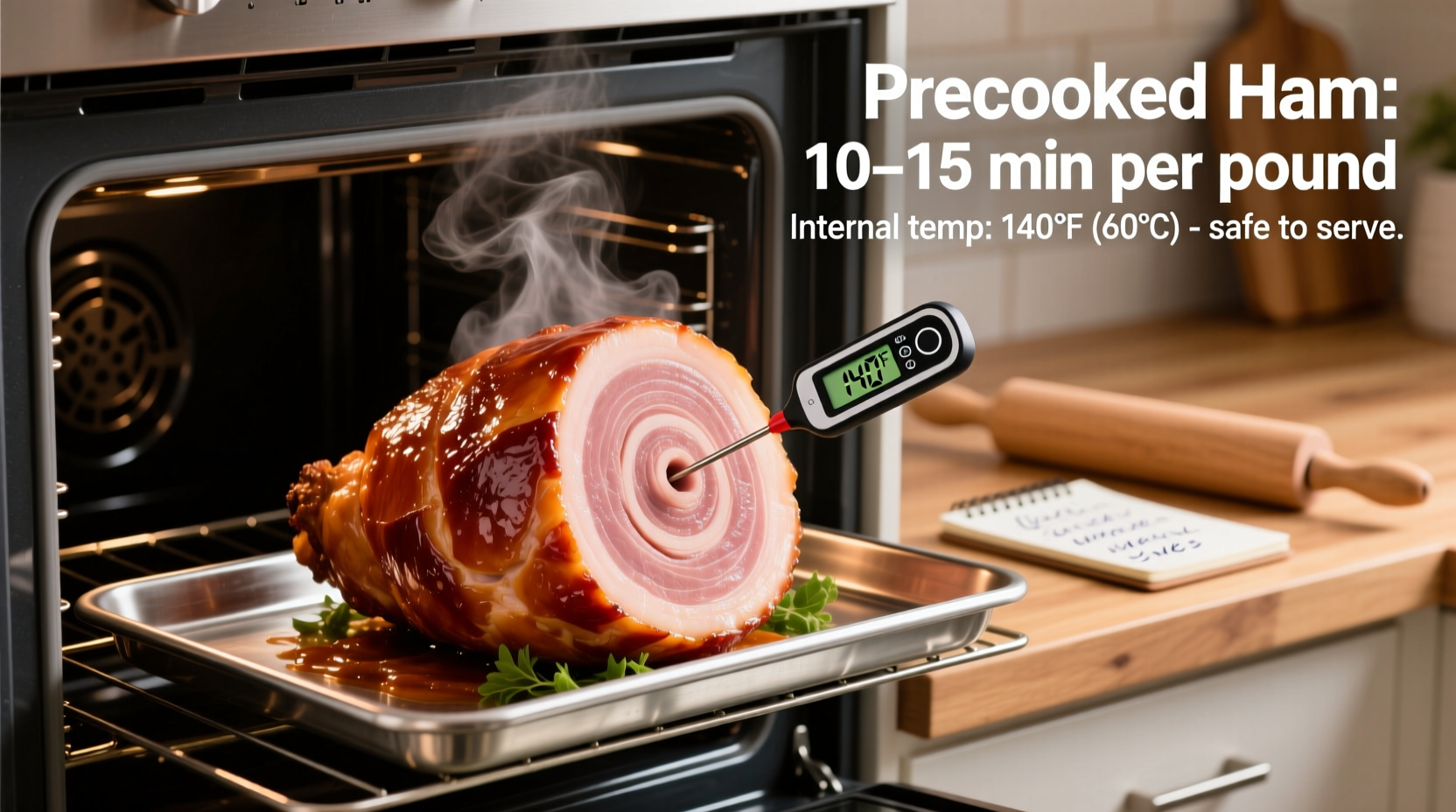Nothing ruins a special occasion meal faster than a dry, overcooked ham or worse—a food safety risk from underheating. Getting the timing right for your precooked ham isn't just about convenience; it's the difference between a succulent centerpiece and a disappointing main course. Whether you're preparing a holiday feast or Sunday dinner, understanding the exact reheating requirements prevents common pitfalls while delivering perfect results every time.
Understanding Your Precooked Ham
Before you start cooking, it's crucial to understand what "precooked" actually means. Most hams sold in grocery stores are fully cooked through smoking or baking during processing. This means they're safe to eat straight from the package, but reheating enhances flavor and texture. The National Pork Board confirms that nearly 90% of hams purchased in the U.S. are fully cooked products requiring only reheating.
Two main types exist:
- City hams: Wet-cured, typically sold in shrink-wrapped packaging
- Country hams: Dry-cured, often requiring soaking before cooking (these are NOT precooked)
For this guide, we're focusing exclusively on city-style precooked hams that simply need reheating.
Preparation Essentials Before Heating
Proper preparation significantly impacts your final results. Follow these steps before your ham hits the oven:
- Thaw completely if frozen (allow 4-5 hours per pound in refrigerator)
- Bring to room temperature for 1-2 hours before cooking
- Score the surface in a diamond pattern, about 1/4 inch deep
- Apply your glaze during the final 20-30 minutes of cooking
Skipping the room temperature step causes uneven heating, leading to either an overcooked exterior or underheated interior. The USDA Food Safety and Inspection Service emphasizes that proper thawing and preparation prevent bacterial growth during the reheating process.
The Perfect Reheating Timeline
Here's the precise cooking formula professional chefs use for flawless results:
| Ham Weight | Approximate Cooking Time | Internal Temp Target |
|---|---|---|
| 5-7 lbs | 50-105 minutes | 140°F (60°C) |
| 7-9 lbs | 70-135 minutes | 140°F (60°C) |
| 9-12 lbs | 90-180 minutes | 140°F (60°C) |
Set your oven to 325°F (163°C) and place the ham cut-side down in a roasting pan with 1/4 inch of liquid (water, broth, or apple juice). Cover loosely with foil to prevent drying. Insert a meat thermometer into the thickest part, avoiding bone.
During the final 20-30 minutes, remove the foil and apply your glaze. This creates that beautiful caramelized exterior without burning the sugar components. Remember that ham continues cooking while resting—a critical step often overlooked by home cooks.

Why Temperature Matters More Than Time
While time calculations provide a helpful framework, your meat thermometer is the true indicator of doneness. Food science explains why:
Ham's protein structure changes at specific temperature thresholds. Below 130°F, proteins remain dense and rubbery. Between 130-140°F, proteins relax, releasing just enough moisture for tenderness without drying out. Exceeding 145°F causes excessive moisture loss, resulting in that dreaded dry, stringy texture.
The USDA's Food Safety and Inspection Service updated their guidelines in 2023, confirming that 140°F is sufficient for reheated precooked meats, down from the previous 145°F recommendation. This small adjustment preserves precious moisture while maintaining safety standards.
Troubleshooting Common Ham Problems
Even with careful planning, issues can arise. Here's how to handle them:
Dry Ham
If your ham emerges too dry, slice it thinner than usual and serve with extra pan juices or a complementary sauce. Prevention is better: always use a thermometer and never exceed 140°F internal temperature.
Underheated Ham
If you've pulled the ham too early (below 140°F), return it to the oven in 10-minute increments, checking temperature each time. Never try to rapidly reheat at higher temperatures—this guarantees uneven cooking and dry spots.
Over-Browned Exterior
If the outside is browning too quickly, reduce oven temperature by 25°F and cover more securely with foil. For future reference, apply glaze later in the cooking process.
Food Safety Essentials
Following proper food safety protocols protects your guests and ensures enjoyable eating:
- Never leave cooked ham at room temperature longer than 2 hours
- Store leftovers within 2 hours in shallow containers
- Refrigerate for up to 3-4 days or freeze for 1-2 months
- Reheat leftovers to 165°F for safety
The Centers for Disease Control and Prevention reports that improper handling of cooked meats contributes to thousands of foodborne illness cases annually. Following these simple guidelines eliminates preventable risks while maximizing enjoyment of your meal.
Perfect Ham Every Time: Pro Tips
Professional chefs employ these techniques to guarantee success:
- Baste every 30 minutes with pan juices for added moisture
- Use apple juice instead of water in the pan for subtle sweetness
- Rest for 15-20 minutes before slicing to redistribute juices
- Slice against the grain for maximum tenderness
- Cook spiral-cut hams cut-side down with reduced time (8-10 minutes per pound)
Remember that oven temperatures vary—calibrate your oven thermometer annually for accuracy. This simple step prevents the most common cause of inconsistent results.
Frequently Asked Questions
Can I cook a precooked ham at 350°F instead of 325°F?
Yes, but reduce cooking time by 20-25% and monitor temperature closely. Higher heat risks drying out the exterior before the interior reaches proper temperature.
How long does a 10-pound precooked ham take to cook?
At 325°F, a 10-pound ham requires approximately 100-150 minutes (1 hour 40 minutes to 2 hours 30 minutes) until reaching 140°F internal temperature.
Do I need to heat a fully cooked ham?
While safe to eat cold, heating enhances flavor and texture. Most culinary experts recommend reheating to 140°F for optimal taste and mouthfeel.
Why does my ham always turn out dry?
Overcooking is the primary culprit. Use a reliable meat thermometer and remove the ham at exactly 140°F, allowing for 5°F carryover cooking during resting.
Can I cook a precooked ham the day before serving?
Yes, but cool quickly and refrigerate within 2 hours. Reheat to 140°F the next day, adding broth to prevent drying during reheating.











 浙公网安备
33010002000092号
浙公网安备
33010002000092号 浙B2-20120091-4
浙B2-20120091-4